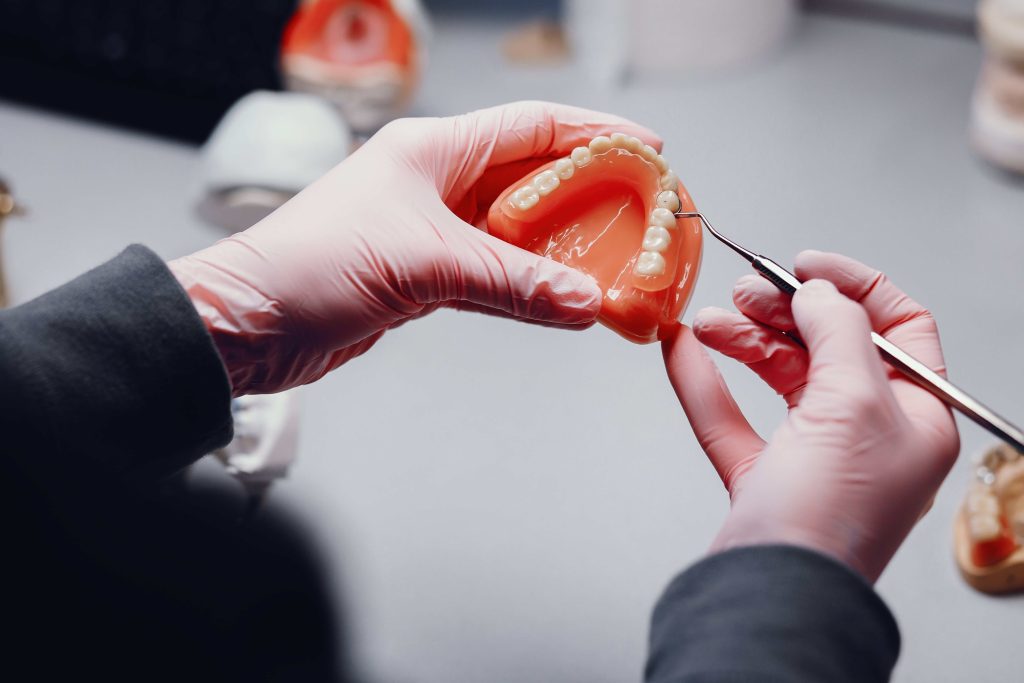Importance of TMJ
The temporomandibular joints, also called TMJ, are joints located on both the side of our face, near and in front of our ears. The joint connects our skull and the lower jaw bone and helps in jaw movements while speaking and chewing.
When there is a misfit, chronic fit, clenching, and grinding of teeth, etc., then it is known to be a TMJ disorder. This can be treated by a dentist or orthodontist without surgery if the case isn’t severe, but if you delay the treatment, then the situation may get worse, and you probably have to go for surgery then.

So, know when you know about TMJ, let me know further about the benefits of TMJ treatment and who it is for!
- Take Less Medication
Taking medication for the long term can sometimes be bad for health, especially when those are painkillers. It might lead you to addiction or dependency on painkillers.
TMJ reduces dependency on the medications, thus reducing your risk of side effects.
- Safeguard Your Teeth and Restorations
TMJ disorders have the potential to harm your teeth. Chronic grinding and clenching of teeth can break or wear down them. The size of your teeth may reduce because of TMJ, which impacts your smile adversely.
Thus, treating TMJ on time helps to balance your smile and restore your teeth earlier and better.
- Restore Balanced Appearance
TMJ may cause asymmetry in the face and unbalance your facial look. The jaw can be imbalanced in several ways if your chewing habits are unbalanced badly, then you might develop larger muscles at one side of the jaw, which leads to a visible tilt in your jawline.
Trading TMJ disorder can make your jaw or jaw muscles normal or make the situation normal for treatment of restorative dentistry to fix your unbalanced look.
- Sleep Better
TMJ is a painful disorder, and a thud may cause you many difficulties, including problems while sleeping. The chronic pain and tenderness in the jaw make it hard to sleep in the right position. Further, the pain may extend to the shoulders, neck, back, and head, and you might be disturbed by the sound made from the clenching and grinding of your teeth.
TMJ treatment makes you relax from all the above problems and lets you sleep calmly.
Who TMJ treatment is for
TMJ disorder is most common among women, especially when they are between their 20s and 40s. So, if you often feel pain in your jaw, neck, shoulder, head, or ear, feel it difficult to open your mouth broadly; popping, grating, or clicking sounds while closing or opening your mount in the jaw joint; ringing or tinnitus in the ethe ar; swelling on one side of your jaw or face, often tooth pain, face tiredness, etc. then you must visit you dentist and consult whether this is all because of TMJ dysfunction or anything else. If the dentist confirms TMJ, then you must start your treatment as soon as possible before the situation gets worse!
Benefits of Dentures
Anyone who has lost their tooth ever through either decay, accident or genetics or has gotten their tooth removed due to poor alignment need to know that they can get their tooth replaced by the procedure known as a denture. There are several kinds of denture implants, such as complete dentures, partial dentures, removable partial dentures, immediate dentures, upper dentures, overdentures, etc. It is very important for you to consult your dentist before choosing any type of denture implant, as the dentist is the best person who can guide you regarding which denture implants would be the right one for you.
However, you need to keep in mind that you choose the right dentist. You would find many dentists who would claim to be the best in denture implants, but all of them are not really the best. So, make sure that you research well about the dentist before trusting them. The cost of dentures depends upon the kind of dentures and the materials used for making them. However, they are quite affordable if you choose the right dentist.

Once your denture implants have been completed, make sure that you take proper care of them by cleaning them daily. Taking great care of dentures is very crucial if you want them to give you a permanent missing tooth solution. Plaque and tartar can still build up on false teeth and can cause damage. So, regular brushing and cleaning with the right product are essential. Moreover, you need to keep in mind that you don’t drop them because they are made from a delicate material that can easily break.
Dentures- Benefits
Missing teeth not only change a person’s appearance but also their smile. Having a beautiful smile also improves a person’s confidence. So, there is no need for a person to go toothless simply because they feel afraid of denture implants. There are some people who need denture implants but are apprehensive to have them. These people need to understand that as the benefits of denture implants are many, they should erase their fears. A person should never avoid getting dentures if the need arises. Below is a list of a few benefits of dentures:
- Dentures help the person to chew like any of their regular teeth.
- Denture implants give or improve natural facial appearance. As they replace the missing teeth, they give support to the lips and cheeks for correcting the collapsed appearance, which usually happens after the loss of teeth.
- Teeth are considered a very important tool in pronunciation. They help in producing the sounds of letters properly. So, having dentures, especially on the front, enables proper pronunciation.
- Having a complete set of teeth actually helps in improving a person’s self-esteem. Moreover, it also helps them to have a better smile.
Dentures- Who is it for?
If you are wondering who can use dentures, then you need to know that denture implants are ideal for people who want to replace their missing teeth. It doesn’t have an age limit. Young adults or even old-aged people can get them.
Sedation Dentistry
Sedation Dentistry is the practice of using sedatives to make a dental practice visit more relaxing and comfortable for anxious patients. During this process, your body can either be put into a sleeping state, or you will remain awake with your senses numbed by light-level anesthesia. The injections of sedatives are not generally as painful as people think, and the effects last for only a short time. Sedation dentists do not prescribe opioid pain medication as part of the procedure, and you should not be worried about this.

How do sedatives work?
There are many different kinds of sedatives available, and each has its own unique effect on the body. Some are intended to put your body into a fully-conscious state but relaxed enough not to feel pain. Others work to fully knock you out. In most cases, dentist offices that offer sedation dentistry will use some form of nitrous oxide and maybe a heavy dose of oral Valium or another one-two-punch combination that makes a very calm patient.
Does sedation dentistry work?
Not all patients feel comfortable with sedation dentistry, but the majority do. For some people, it can be a great way to allow themselves to experience a genuine dental appointment without getting into a state of panic. Your dentist, like Dr. David Better, will want an honest appraisal of your comfort level with sedation dentistry before your appointment, and you should tell them ahead of time.
Benefits of sedation dentistry include:
No stimulus control is needed when using a light amount of anesthesia or sedation; This lowers anxiety levels and gives the patient time to fall asleep without any external stimuli being present. Patients are not afraid of being awake during procedures, and they are open to hearing every word that is being said. The patient’s mind is not constantly subjecting them to images, sounds, and thoughts that cause stress. The effects of having an upset stomach or upset bowels will be blocked with sedation dentistry.
Also, the fact that the patient is under anesthesia or sedation completely blocks out pain. This can be especially useful with patients who have a hard time being put under a general anesthetic and experience great anxiety during dental procedures, and would rather be sedated.
The latest devices are being produced to help patients relax more easily, like comfortable pillows, blankets, warm air blankets, and much more. Also, many practices now offer sedation dentistry for children as well.
Who is it For?
Sedation dentistry is for anybody who wishes to be sedated during their dental procedure. This can apply to patients who know that they have a hard time staying calm during a visit. It can also be great for children or other family members who would like to experience what it is like to go through a dental cleaning or procedure without the fear of pain.
Sedation is quickly growing in popularity, and many different dentists are now offering this as an option for their patients. Not only does it give you the chance to be completely relaxed, but also it allows your dentist to put your mind at ease. You no longer have to worry about being able to relax and avoid pain during dental visits with the help of sedation dentistry.
What is Sleep Apnea?
It is a disorder of breathing while sleeping which creates pauses in breathing or even total cessation of breathing. These events happen repeatedly and during the sleep cycle and can last from 1 second to hours. These pauses in breathing create a large number of temporary dips in blood oxygen levels, which is called apnea. You might have heard about people who die from their Sleep Apnea because it causes hypoxia, which leads to brain injury or death. This can be prevented by undergoing surgery or wearing a CPAP device during sleep.
Causes of Sleep Apnea
One of the most common causes of sleep apnea is being overweight. This problem is usually caused by a combination of an increase in soft tissues in the neck and throat and a corresponding decrease in muscle tone in those areas. The decrease in muscle tone results from a decrease in the production of serotonin and relaxin, which are neurotransmitters that help muscles relax. Excess fat deposits around the throat can also result in an increased risk of sleep apnea because they compress the windpipe and make breathing more difficult as you sleep.

Another cause of sleep apnea is a small hole in the upper part of the windpipe. The hole allows air to escape, which creates a constant flow of air through the airways. This flow of air through the airways causes the patient’s muscles to spasm. Some people are born with this small hole and others develop it over time due to head or neck trauma or certain types of surgery on their throats.
Symptoms of Sleep Apnea
The most common symptoms of sleep apnea are simply snoring and abnormally loud breathing that occurs at night. Sometimes the loud breathing is accompanied by restlessness or an increased heart rate and blood pressure.
Treatment of Sleep Apnea
Treatment for sleep apnea can include losing weight, using a CPAP device, and in some cases, undergoing surgery. Using a CPAP device is probably the most common treatment for sleep apnea that is used by patients with mild to moderate forms of the disease. The device is called continuous positive airway pressure and it requires that you wear a mask on your face while you sleep. This mask will pressurize your throat so that it remains open during sleep and prevents muscle spasms that cause pauses in breathing. This is much safer than surgery because it is a mechanical fix and not an invasive surgical procedure.
A CPAP machine will help patients who have mild to moderate forms of sleep apnea to get a better quality of sleep, but it will not cure them of the disease. Those who are severely affected by the condition might need surgery to correct the problem and prevent their snoring from causing further damage to their throat.
We are all affected by sleep apnea disorder to some degree. The condition causes the patient’s muscles to relax during the night in order to stop snoring and loud breathing. If a person is overweight or has a hole in their throat, they are more likely to suffer from this condition and will be more susceptible to developing sleep apnea as well.
Oral Surgery
Do you know what the fastest-growing surgical specialty is? Oral surgery. This means there are a lot of folks who need oral surgeries. If that sounds like you, here’s what you need to know about them, who they’re for, and why they’re necessary.

What is Oral Surgery?
Oral surgery is a surgical specialty that involves the oral cavity and its related structures. These surgeries are usually necessary for medical purposes. Dentists usually perform these so that their patients can enjoy complete health again.
The most common procedure performed by oral surgeons is removing a wisdom tooth, also known as an impacted tooth.
Who needs Oral surgery?
Oral surgery is commonly performed on patients with severe dental problems and those with long term dental problems.
Oral surgery is for anyone who has suffered from teeth damage and needs serious dental work to keep their mouth healthy.
- Adults who have oral infections and need surgical removal of excess tissues
- People with missing teeth and damage to their jawbone, sinuses, cheeks and lips.
- Adults with wisdom teeth that are impacted or have complications, or crowding due to an overbite or a jaw that is crowded.
- Children with birth defects such as cleft lip or palate.
If you think that you may need oral surgery, talk to your dentist or surgeon.
It’s also a specialty that has many available practitioners, including oral surgeons, oral and maxillofacial surgeons and dentists.
Their work includes;
- The removal of impacted or trapped teeth.
- Correcting jaw irregularities.
- Restoring broken or damaged teeth.
- Treating gum disease.
- Treating cancerous growths on the gums.
- Replacing missing teeth with implants that are anchored into the jawbone or removable dentures.
Benefits of oral surgery
Oral surgery brings forth so many benefits to those who get it including;
- Great improvements in speech problems. A greater sense of confidence and control over one’s mouth, which helps in public speaking, interviews and social situations.
- Helping you correct problems related to tooth size or spacing, which often affect the health of the teeth and cause bad habits in chewing.
3. Restoring lost or damaged teeth and supporting structures in the mouth, giving a firm, healthy jawline, which improves overall facial aesthetics.
- Helping you restore your jaw function if the jaws are growing together improperly, called ankylosis. Improving chances of achieving healthy gums.
- Eliminating chronic bad breath. Better oral hygiene since oral surgery removes harmful particles lurking in the mouth.
- Overcoming gum disease and improving periodontal health, which can reduce long-term risks for stroke, heart problems and diabetes.
This also ensures reduced risk of tooth decay and tooth loss due to weak gums.
- Eliminating pain caused by abscessed teeth and infected gums. Reducing the risk for jaw bone loss in people’s jaws, especially when coupled with good hygiene practices.
- Resolving jaw problems causing facial pain, headaches and TMJ.
- Resolving temporomandibular joint disorder (TMJ), a condition that causes jaw pain and difficulty in chewing.
- Improving the appearance of your face and helping you restore your natural smile. A beautiful smile boosts self-confidence and makes it easier to get a job and make friends.
Conclusion;
In summary, oral surgery is a procedure that’s necessary for improved oral health and overall wellness. It is for anyone with a serious dental problem or long-term dental problem that cannot heal or come to a conclusion on its own.
If you think you need it, talk to your doctor so you can decide if you’re a candidate.